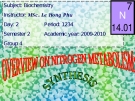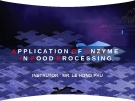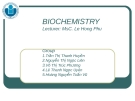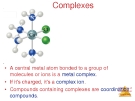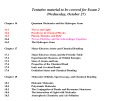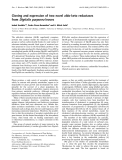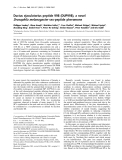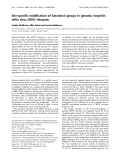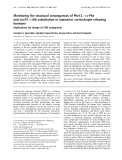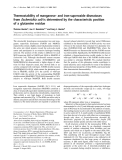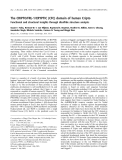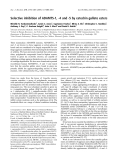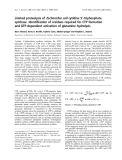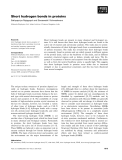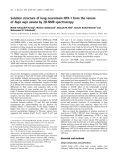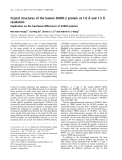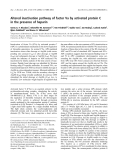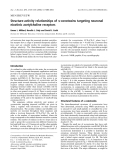
Chemical bonds
-
Refers to a natural process converting atmospheric nitrogen to ammonium to yield usable nitrogen source. • Only a few prokaryotic species can "fix" nitrogen. • Nitrogenase complex dinitrogenase dinitrogenase reductase
 114p
114p  zingzing09
zingzing09
 21-10-2012
21-10-2012
 92
92
 8
8
 Download
Download
-
Alter the appearance, aroma, texture and flavor of a product. Deliver nutrients more effectively to the body or to make a food that is difficult to digest a bit easier to swallow. Accelerate the good fermentation time, giving a finished product in weeks instead of months.
 36p
36p  zingzing09
zingzing09
 21-10-2012
21-10-2012
 103
103
 19
19
 Download
Download
-
Many enzymes are added to grain feeds in order to convert some of the indigestible carbohydrates acting only as dietary fiber to accessible energy sources. amylases and glycases
 24p
24p  zingzing09
zingzing09
 21-10-2012
21-10-2012
 86
86
 10
10
 Download
Download
-
A central metal atom bonded to a group of molecules or ions is a metal complex. • If it’s charged, it’s a complex ion. Chemistry • Compounds containing complexes are coordination of Coordination Compounds compounds.The molecules or ions coordinating to the metal are the ligands.
 77p
77p  tringuyen215dh11h1
tringuyen215dh11h1
 05-10-2013
05-10-2013
 62
62
 6
6
 Download
Download
-
Quantum Mechanics and the Hydrogen Atom, Many-Electron Atoms and Chemical Bonding, Molecular Orbitals, Spectroscopy, and Chemical Bonding,... as the main contents of the lesson lecture 9 "Tentative material to be covered for Exam 2". Invite you to consult the lesson for more documents serving the academic needs and research.
 38p
38p  nguyenphong201
nguyenphong201
 11-12-2015
11-12-2015
 41
41
 3
3
 Download
Download
-
The aldo-keto reductase (AKR) superfamily comprises proteins that catalyse mainly the reduction of carbonyl groups or carbon–carbon double bonds of a wide variety of substrates including steroids. Such types of reactions have been proposed to occur in the biosynthetic pathway of the cardiac glycosides produced by Digitalis plants. Two cDNAs encoding leaf-specific AKR proteins (DpAR1 and DpAR2) were isolated from a D. purpurea cDNA library using the rat D4-3-ketosteroid 5b-reductase clone.
 9p
9p  system191
system191
 01-06-2013
01-06-2013
 43
43
 4
4
 Download
Download
-
We have characterized a glycosylated, 31 amino-acid peptide of 4932 Da isolated from Drosophila melanogaster males. The mature peptide contains a sugar moiety of 1184 Da at a NDT consensus glycosylation site and a disulfide bond. It is synthesized in the male ejaculatory duct via a 54 amino-acid precursor containing an N-terminal signal peptide and Arg-Lys at the C-terminus which is cleaved off during maturation. The gene contains an intron of 53 bp and is localized in the cytological region 99B of the D. melanogaster genome....
 9p
9p  research12
research12
 01-06-2013
01-06-2013
 41
41
 4
4
 Download
Download
-
Weak neurotoxins from snake venom are small proteins with five disulfide bonds, which have been shown to be poor bindersof nicotinicacetylcholine receptors.We report on the cloning and sequencing of four cDNAs encoding weak neurotoxins fromNaja sputatrixvenomglands. The protein encoded by one of them, Wntx-5, has been synthesized by solid-phase synthesis and characterized.
 10p
10p  research12
research12
 23-04-2013
23-04-2013
 46
46
 4
4
 Download
Download
-
Human hepatitis delta (HDV) ribozyme is one of small ribozymes, such as hammerhead and hairpin ribozymes, etc. Its secondary structure shows pseudoknot structure com-posed of four stems (I to IV) and three single-stranded regions (SSrA, -B and -C). The 3D structure of 3¢-cleaved product of genomic HDV ribozyme provided extensive information about tertiary hydrogen bonding interactions between nucleotide bases, phosphate oxygens and 2¢OHs including new stem structure P1.1.
 12p
12p  tumor12
tumor12
 22-04-2013
22-04-2013
 39
39
 3
3
 Download
Download
-
A new human/rat CRH analogue has been synthesized using the Fmoc/tBu solid-phase synthetic protocol. The sequence ofthe new peptide differs from the original in two positions, 12 and 15, at which the native amino acids L-phenylalanine 12 and L-leucine 15 have been replaced by the nonprotein amino acids D-phenylalanine and a-aminoisobutyric acid (Aib), respectively. The high resolution three-dimensional solution structure of [D-Phe12, Aib15]CRH has been determined by 688 dis-tance constraints (656 meaningful NOE and 32 H-bonds distance limits) and 21 angle constraints. ...
 11p
11p  tumor12
tumor12
 22-04-2013
22-04-2013
 38
38
 3
3
 Download
Download
-
The structurally homologous mononuclear iron and man-ganese superoxide dismutases (FeSOD and MnSOD, respectively) containa highly conservedglutamine residue in the active site which projects toward the active-site metal centre and participates in an extensive hydrogen bonding network. The position of this residue is different for each SOD isoenzyme (Q69 in FeSOD and Q146 in MnSOD of Escherichia coli).
 12p
12p  tumor12
tumor12
 22-04-2013
22-04-2013
 48
48
 3
3
 Download
Download
-
The disulfide structure of the CRIPTO/FRL-1/CRYPTIC (CFC) domain of human Cripto protein was determined by a combination of enzymatic and chemical fragmentation, followed by chromatographic separation of the fragments, and characterization by mass spectrometry and N-terminal sequencing. These studies showed that Cys115 forms a disulfide bond with Cys133, Cys128 with Cys149, and Cys131 with Cys140.
 9p
9p  tumor12
tumor12
 20-04-2013
20-04-2013
 28
28
 3
3
 Download
Download
-
Three mammalian ADAMTS enzymes, ADAMTS-1, -4 and -5, are known to cleave aggrecan at certain glutamyl bonds and are considered to be largely responsible for car-tilage aggrecan catabolismobservedduring the development of arthritis. We have previously reported that certain cate-chins, polyphenolic compounds found in highest concen-trationingreentea(Camellia sinensis), are capable of inhibiting cartilage aggrecan breakdown in anin vitromodel of cartilage degradation.
 10p
10p  fptmusic
fptmusic
 16-04-2013
16-04-2013
 31
31
 3
3
 Download
Download
-
Cytidine 5¢-triphosphate synthase catalyses the ATP-dependent formation of CTP from UTP using either ammonia orL-glutamine as the source of nitrogen. When glutamine is the substrate, GTP is required as an allosteric effector to promote catalysis. Limited trypsin-catalysed proteolysis, Edman degradation, and site-directed muta-genesis were used to identify peptide bonds C-terminal to three basic residues (Lys187, Arg429, and Lys432) of Escherichia coliCTP synthase thatwere highly susceptible to proteolysis. ...
 12p
12p  fptmusic
fptmusic
 16-04-2013
16-04-2013
 41
41
 4
4
 Download
Download
-
Báo cáo khoa học: Short hydrogen bonds in proteins Sathyapriya Rajagopal and Saraswathi Vishveshwara
hort hydrogen bonds are present in many chemical and biological sys-tems. It is well known that these short hydrogen bonds are found in the active site of enzymes and aid enzyme catalysis. This study aims to system-atically characterize all short hydrogen bonds from a nonredundant dataset of protein structures. The study has revealed that short hydrogen bonds are commonly found in proteins and are widely present in different regions of the protein chain, such as the backbone or side chain, and in different secondary structural regions such as helices, strands and turns. ...
 14p
14p  awards
awards
 06-04-2013
06-04-2013
 44
44
 3
3
 Download
Download
-
The NMR solution structures of NTX-1 (PDB code 1W6B and BMRB 6288), a long neurotoxin isolated from the venom ofNaja naja oxiana, and the molecular dynamics simulation of these structures are reported. Calculations are based on 1114NOEs, 19 hydrogen bonds, 19 dihedral angle restraints and secondary chemical shifts derived from 1 Hto 13 C HSQC spectrum. Similar to other long neurotoxins, the three-finger like structure shows a double and a triple strandedb-sheet aswell as some flexible regions, particularly at the tip of loop II and the C-terminal tail....
 0p
0p  awards
awards
 05-04-2013
05-04-2013
 49
49
 2
2
 Download
Download
-
The SUMO proteins are a class of small ubiquitin-like modifiers. SUMO is attached to a specific lysine side chain on the target protein via an isopeptide bond with its C-terminal glycine.Thereareat least fourSUMOproteins in humans, which are involved in protein trafficking and tar- geting. A truncated human SUMO-2 protein that contains residues 9–93 was expressed inEscherichia coliand crystal- lized in two different unit cells, with dimensions of a ¼b¼ 75.25 A ˚ ,c¼29.17 A ˚ and a¼b¼74.96 A ˚ ,c¼33.23 A ˚ , both belonging to the rhombohedral space groupR3. They diffractedX-rays to1.
 9p
9p  awards
awards
 05-04-2013
05-04-2013
 42
42
 4
4
 Download
Download
-
Inactivation of factor Va (FVa) by activated protein C (APC) is a predominant mechanism in the down-regulation of thrombin generation. In normal FVa, APC-mediated inactivation occurs after cleavage at Arg306 (with corres-pondingrate constantk¢306) or after cleavage at Arg506 (k506 ) and subsequent cleavage at Arg306 (k306). We have studied the influence of heparin on APC-catalyzed FVa inactivation by kinetic analysis of the time courses of inac-tivation. Peptide bond cleavage was identified by Western blottingusingFV-specific antibodies. ...
 13p
13p  dell39
dell39
 03-04-2013
03-04-2013
 42
42
 4
4
 Download
Download
-
Cn12 isolated from the venom of the scorpionCentruroides noxiushas 67 amino-acid residues, closely packed with four disulfide bridges.Its primary structure and disulfide bridges were determined.Cn12 is not lethal to mammals and arthropodsin vivoat doses up to 100lgper animal.Its3D structure was determined by proton NMR using 850 dis-tance constraints, 36 /angles derived from 36 coupling constants obtained by two different methods, and 22 hydrogen bonds.
 13p
13p  dell39
dell39
 03-04-2013
03-04-2013
 48
48
 3
3
 Download
Download
-
a-Conotoxins that target the neuronal nicotinic acetylcho-line receptor have a range of potential therapeutic applica-tions and are valuable probes for examining receptor subtype selectivity. The three-dimensional structures of about half of the knownneuronal specifica-conotoxins have nowbeendeterminedandhaveaconsensus foldcontaininga helical region braced by two conserved disulfide bonds. These disulfide bonds define the two-loop framework char-acteristic for a-conotoxins, CCXmCXnC, where loop 1 comprisesfourresidues(m¼4) and loop 2 between three and seven residues (n¼3, 6 or 7). ...
 7p
7p  dell39
dell39
 03-04-2013
03-04-2013
 44
44
 4
4
 Download
Download
CHỦ ĐỀ BẠN MUỐN TÌM








